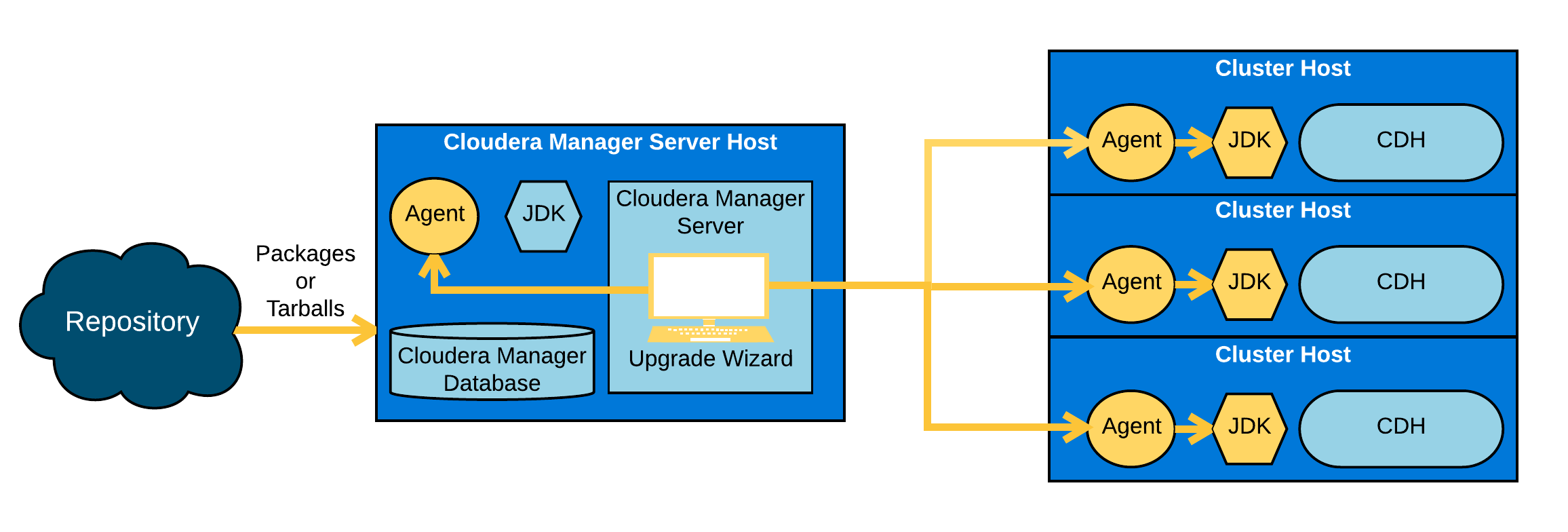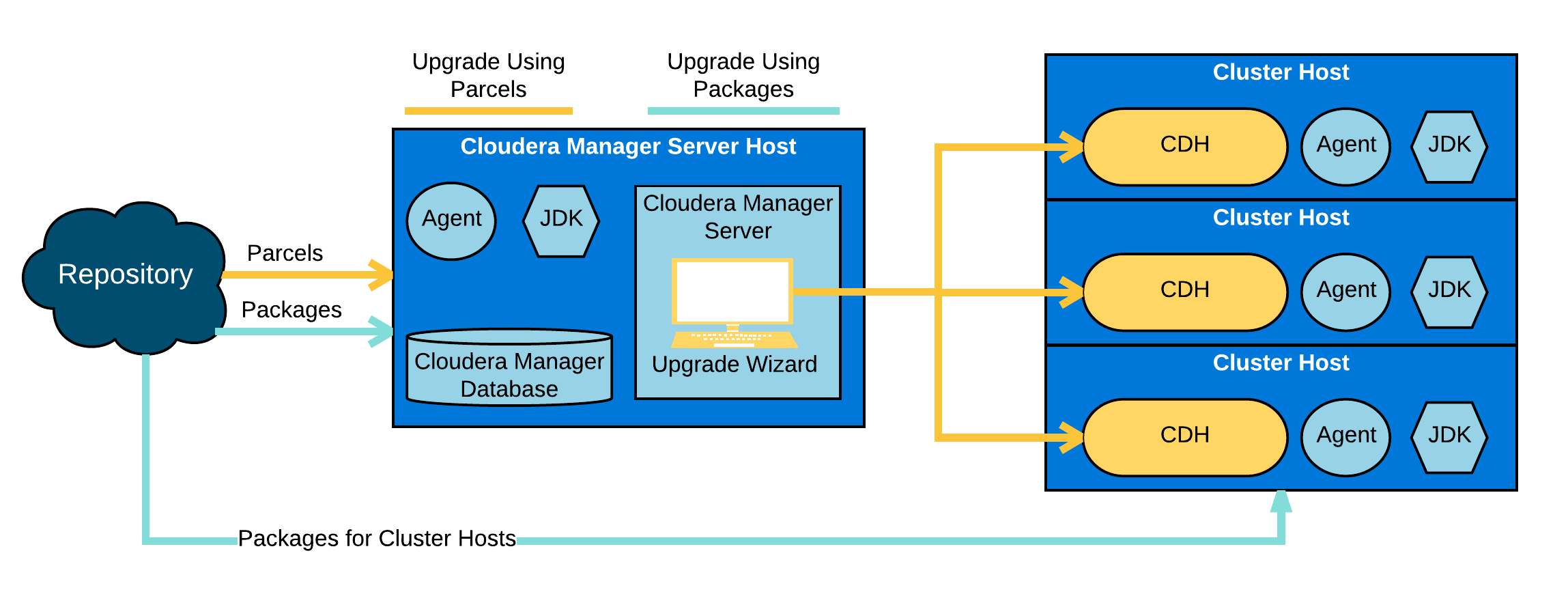Upgrading Cloudera Manager and CDH
- Performing Upgrade Wizard Actions Manually
- Upgrading to CDH 5.8.0 or CDH 5.8.1 When Using the Flume Kafka Client
- Upgrading to Oracle JDK 1.8
- Upgrading Cloudera Navigator Components
- Upgrading the Cloudera Navigator Data Management Component
- Upgrading Cloudera Navigator Key Trustee Server
- Upgrading Cloudera Navigator Key Trustee Server 3.x to 5.4.x
- Upgrading Cloudera Navigator Key Trustee Server 3.8 to 5.5 Using the ktupgrade Script
- Upgrading Cloudera Navigator Key Trustee Server 5.4.x or Higher
- Upgrading Cloudera Navigator Key HSM
- Upgrading Key Trustee KMS
- Upgrading Couldera Navigator HSM KMS
- Upgrading Cloudera Navigator Encrypt
- Creating and Using a Package Repository for Cloudera Manager
- Database Considerations for Cloudera Manager Upgrades
- Re-Running the Cloudera Manager Upgrade Wizard
- Reverting a Failed Cloudera Manager Upgrade
- Upgrading Unmanaged CDH Using the Command Line
- Upgrading from an Earlier CDH 5 Release to the Latest Release
- Before Upgrading to the Latest Release of CDH
- Upgrading from CDH 5.4.0 or Higher to the Latest Release
- Upgrading from a Release Lower than CDH 5.4.0 to the Latest Release
- Upgrading Host Operating Systems in a CDH Cluster
Upgrade Overview
This topic provides an overview of upgrade procedures for Cloudera Manager and CDH.
The procedures described here are for clusters managed by Cloudera Manager. For information about upgrading unmanaged CDH clusters (clusters that are not managed by Cloudera Manager), see Upgrading Unmanaged CDH Using the Command Line.
When upgrading Cloudera Manager, you can use tarballs or operating system packages. When upgrading CDH, you can use packages or parcels. You might also need to install a new version of the JDK. Cloudera Navigator is also upgraded when you upgrade Cloudera Manager.
You are not required to upgrade Cloudera Manager and CDH at the same time, but the versions of Cloudera Manager and CDH must be compatible. Cloudera Manager can manage clusters for the current and previous major versions of CDH and any equal or lower minor version of CDH. For example, Cloudera Manager 5.7.1 can manage clusters with CDH 5.7.2, CDH 5.6.1, and CDH 4.8.6 but cannot manage a cluster with CDH 5.8.1. Cloudera Manager 5.x cannot manage clusters using CDH 3.x.
You can choose from several options as you upgrade:

Continue reading:
Assessing the Impact of an Upgrade
Plan for a sufficient maintenance window to perform an upgrade. Depending on which components you are upgrading, the number of hosts in your cluster, and the type of hardware, you might need up to a full day to upgrade your cluster. Before you begin the upgrade, you need to gather some information; these steps are also detailed in the Cloudera Manager and CDH upgrade procedures.
Before upgrading, consult the release notes for Cloudera Manager and CDH to learn about API changes, deprecated features, new features, and incompatible changes. Also check the CDH 5 and Cloudera Manager 5 Requirements and Supported Versions page to make sure that you are using a supported operating system, JDK, database, and other components.
- Major Upgrades
- A major upgrade typically has the following characteristics:
- Large changes to functionality and update of Hadoop to a more recent version
- Incompatible changes in data formats
- Significant changes and additions to the user interface in Cloudera Manager
- Database schema changes for Cloudera Manager that are automatically handled by the upgrade process
- Significant down time for the cluster is required.
- Client configurations are redeployed.
- Minor Upgrades
- Minor upgrades upgrade your software to a higher minor version of a major release—for example from version 5.4.x to version 5.8.x—and typically include the following:
- New functionality
- Bug fixes
- Potential database schema changes for Cloudera Manager that are handled automatically
- Maintenance Upgrades
- Maintenance upgrades are used only to fix critical bugs or address security issues. No new functionality or incompatible changes are introduced.
Overview of Upgrading Cloudera Manager

- Upgrade the Cloudera Manager server software on the Cloudera Manager host using operating system package commands from the command line (for example, yum on RHEL systems). You can also manually upgrade Cloudera Manager using tarballs. Tarball upgrades are more suitable for environments in which existing tools are used to manage software distributed over many hosts. Cloudera Manager automates much of this process and is recommend for upgrading and managing your CDH clusters.
- Upgrade the Cloudera Manager agent software on all cluster hosts. The Cloudera Manager upgrade wizard can upgrade the agent software (and, optionally, the JDK), or you can install the agent and JDK software manually from tarballs. The CDH software is not upgraded during this process.
To upgrade Cloudera Manager, see Upgrading Cloudera Manager.
Overview of Upgrading CDH


Upgrading CDH using parcels is the preferred method because parcels are managed by Cloudera Manager, which automatically downloads, distributes, and activates the correct versions of the software. There are two types of parcel upgrades:- Parcels – Requires you to restart the cluster to complete the upgrade.
- Rolling Upgrade– If you have enabled high availability for HDFS, you can perform a rolling upgrade to upgrade CDH without cluster down time. For an easier upgrade experience, consider switching from packages to parcels so that Cloudera Manager can automate more of the process. You can also switch from packages to parcels when upgrading CDH 5.

Upgrading CDH using packages requires you to download updated packages and manually run package upgrade commands on the Cloudera Manager server and all cluster hosts.
To upgrade CDH, see Upgrading CDH Using Cloudera Manager
Overview of Upgrading Cloudera Navigator Components
Cloudera Navigator Metadata and Audit servers are automatically upgraded when you upgrade Cloudera Manager. You can also optionally upgrade other Cloudera Navigator components such as Cloudera Navigator Key Trustee Server, Cloudera Navigator Key HSM, and Cloudera Navigator Encrypt. You do not have to upgrade these components along with Cloudera Manager or CDH upgrades.
Upgrading the JDK
| << Troubleshooting Installation Problems | ©2016 Cloudera, Inc. All rights reserved | Upgrading Cloudera Manager >> |
| Terms and Conditions Privacy Policy |